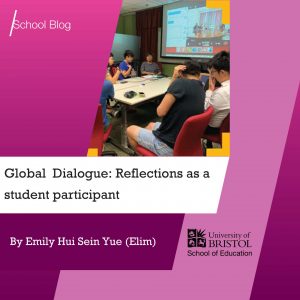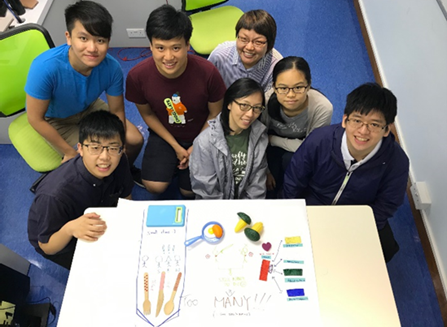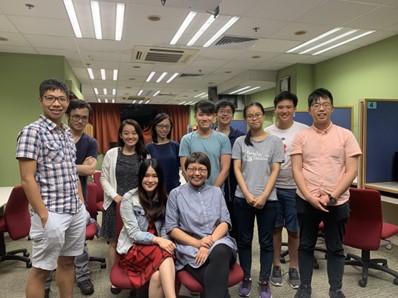 Blog by Emily Hui Sein Yue (Elim), Master of Education (MEd)(Comparative and Global Studies in Education and Development)student, Faculty of Education, the University of Hong Kong.
Blog by Emily Hui Sein Yue (Elim), Master of Education (MEd)(Comparative and Global Studies in Education and Development)student, Faculty of Education, the University of Hong Kong.
I first participated in the Going Global Project in 2019, going on to be a facilitator. In this article, I share my experiences and thoughts about the value of the dialogue meetings that I have been involved in.
Going Global
The Going Global Project is a pioneering education programme which promotes intercultural online dialogue between pre-service teachers based in different countries via video conferencing. The programme aims to promote global learning in which the participants learn about one another, embrace cultural diversity with open-mindedness, and explore shared challenges.
Between 2019 and 2022, Going Global Project meetings have been organised through collaboration between the School of Education, University of Bristol and other universities in Northern Ireland, South Africa and my own alma mater, The Chinese University of Hong Kong.
Pre-service teachers have been given the opportunity to explore educational issues, environmental problems and possible solutions through dialogical discussions. Prior to the online meetings, participants shared some topic-related photos on Padlets to build up a sense of common concerns as a community of inquiry. During the video conferences, the participants supported online discussion by sharing files to record them collaboratively. In Hong Kong, participants were also invited to create art pieces together to represent what they learnt from the dialogues after the meetings had happened.

2019: Participating as pre-service teacher
As a pre-service teacher, I participated in two Global Dialogues in 2019 discussing educational issues such as ‘quality education’ and ‘inclusive education’. It was an eye-opening experience as I was exposed to different interpretations of the issues. For example, participants from England related the topic of inclusive education to gender and identity issues, participants from Northern Ireland drew on their lived experience of religious and sectarian differences to discuss inclusive school practices. Meanwhile, South African participants focused on inclusive education as related to racial issues. I realized that there are different lenses for looking at educational issues.
Global Dialogue was also a useful way for me to have first-hand experience of multicultural interactions. In the globalised world, people’s communication is far beyond the local context. Students may need to cooperate with people from different cultural background in their career or study. It is necessary for students to be well-prepared to embrace cultural differences and perceptual differences. Through the Global Dialogues, I could also be equipped to teach my students how to interact in a multicultural world. Since our perceptions are influenced by our cultural background, there is no absolute answer in understanding the global issues. Mutual respect during the interactive process can allow my fellow participants and I to understand each other’s lives, values, and beliefs.

2022: Participating as facilitator
In 2022, I served as a facilitator in two Global Dialogues on climate change which were participated by tutors as well as pre-service teachers from universities in Hong Kong and the United Kingdom. In terms of the topic, the experience allowed me to mediate the interaction by inviting participants from the two countries to reflect on the effectiveness of environmental education in their living place.
For example, I observed the different ways in which environmental education has been implemented, depending on the local context. For instance, schools in the United Kingdom utilised technology such as virtual field trips to maintain experiential learning in nature under the pandemic. Hong Kong tried to implement environmental education at an earlier stage on the curriculum compared to the United Kingdom, but the content mainly focused on actions by individuals (i.e., personal habits and characteristics). Despite the curricular differences between the two countries represented, the dialogues gathered participants so that they could seek possible common solutions to combat the challenges of climate change.
The participants compiled lists of actions that educators can take to alleviate environmental problems, again using Padlet. I witnessed the togetherness among all the participants undertaking this activity, regardless of their cultural background, discussing possible solutions to alleviate environmental problems. Going forwards, could we further develop the medium of global dialogue to discuss the ways for students and pre-service teachers to combat the challenges of climate change?

Transforming dialogue experience into pedagogical skills
As an in-service teacher, the skills that I learnt in Global Dialogues have been transformed into pedagogical techniques in my current teaching. In 2022, I organized four global dialogues about water sanitation and energy use for my elementary students, connecting six International Baccalaureate schools from India, Japan, Pakistan, United States, and Malaysia. The global discussion further proved what I observed in the previous facilitation of Global Dialogues on climate change; environmental issues do connect people together. My students had a heated discussion with other primary students about water problems, overuse of non-renewable energy and environmental problems faced. Overall, it was a win-win situation for my students’ learning and my professional development.
To be continued
To me, Global Dialogue is a camera with many filters, by which I mean an experience that helps me to perceive and teach global issues from multiple perspectives. Furthermore, Global Dialogue has built a good platform for us as participants, to gather thoughts and seek solutions in combating global problems, including diversity of various kinds and most recently environmental issues.
In the future, I hope opportunities for Global Dialogue in teacher education will continue to provide a useful tool to connect students and educators around the world in exploring alternative ways to resolve shared challenges.
About the author
Emily Hui Sein Yue (Elim) was a participant on Going Global in 2019 and a facilitator of the online dialogues in 2022. Elim is a student on the Master of Education (MEd)(Comparative and Global Studies in Education and Development) programme in the Faculty of Education, the University of Hong Kong. She teaches in a primary school in Hong Kong and advocates Global Dialogues for IBPYP schools in India, Japan, Malaysia, Pakistan and the United States. Her research interests include Global Education and Environmental Education.
